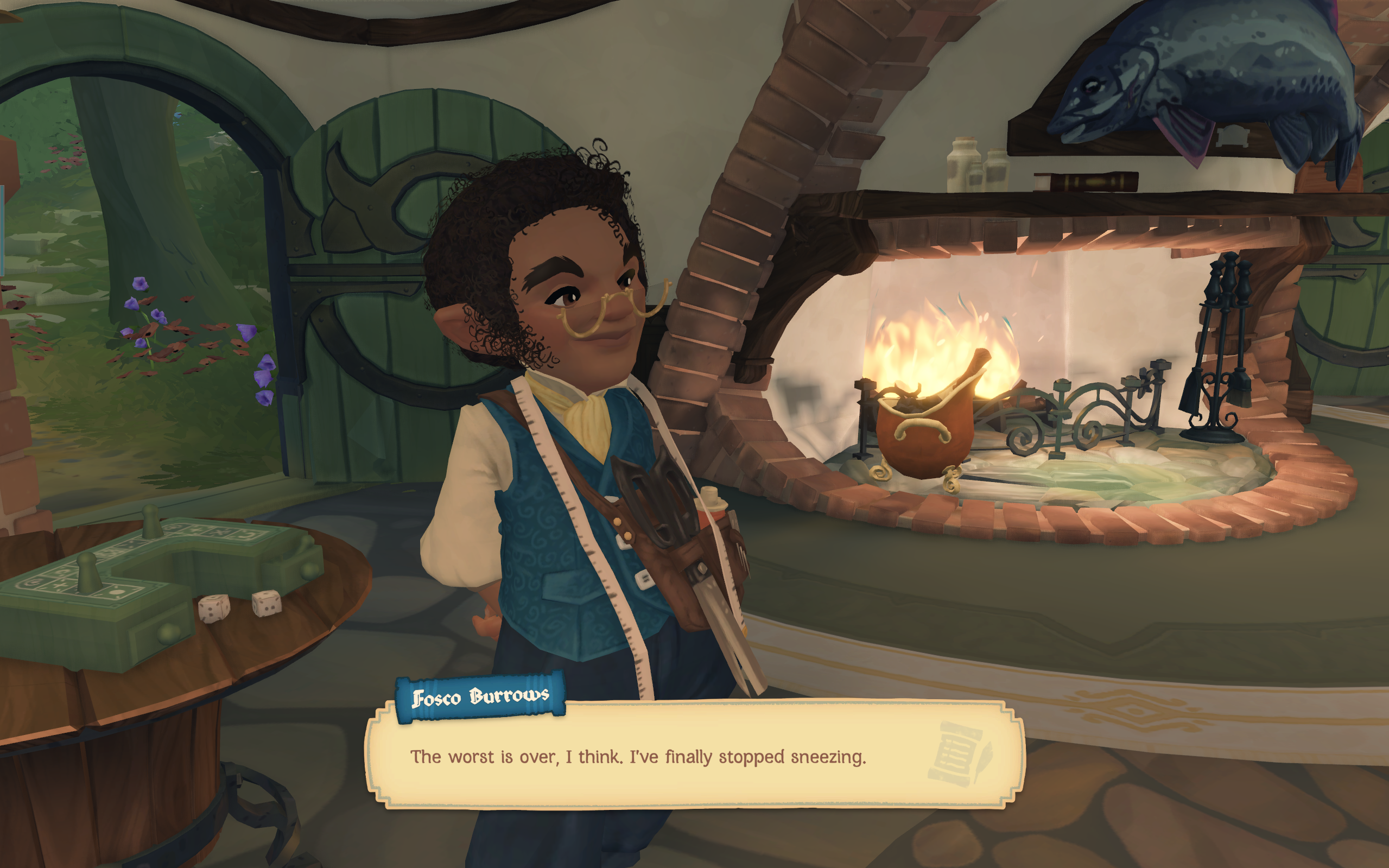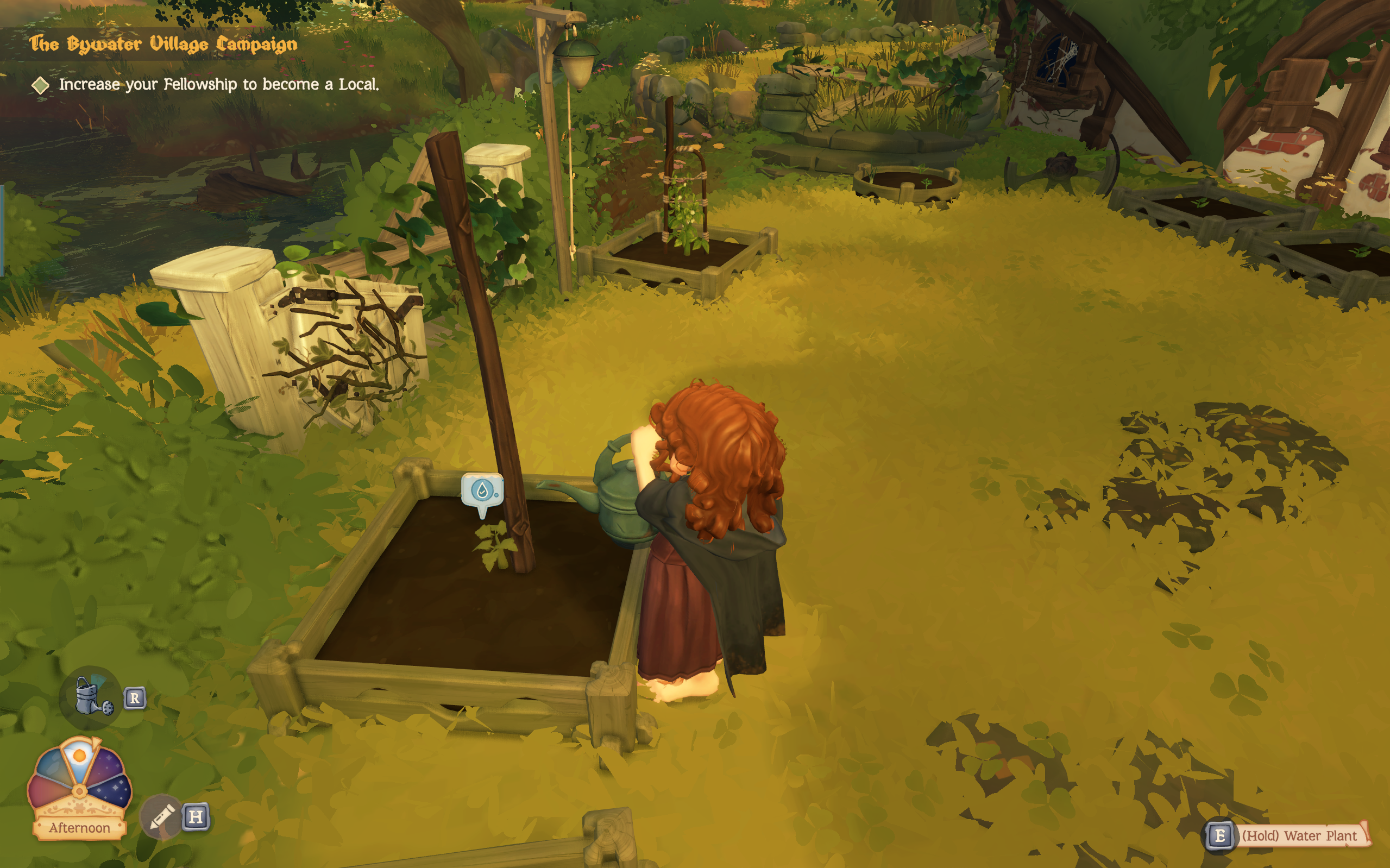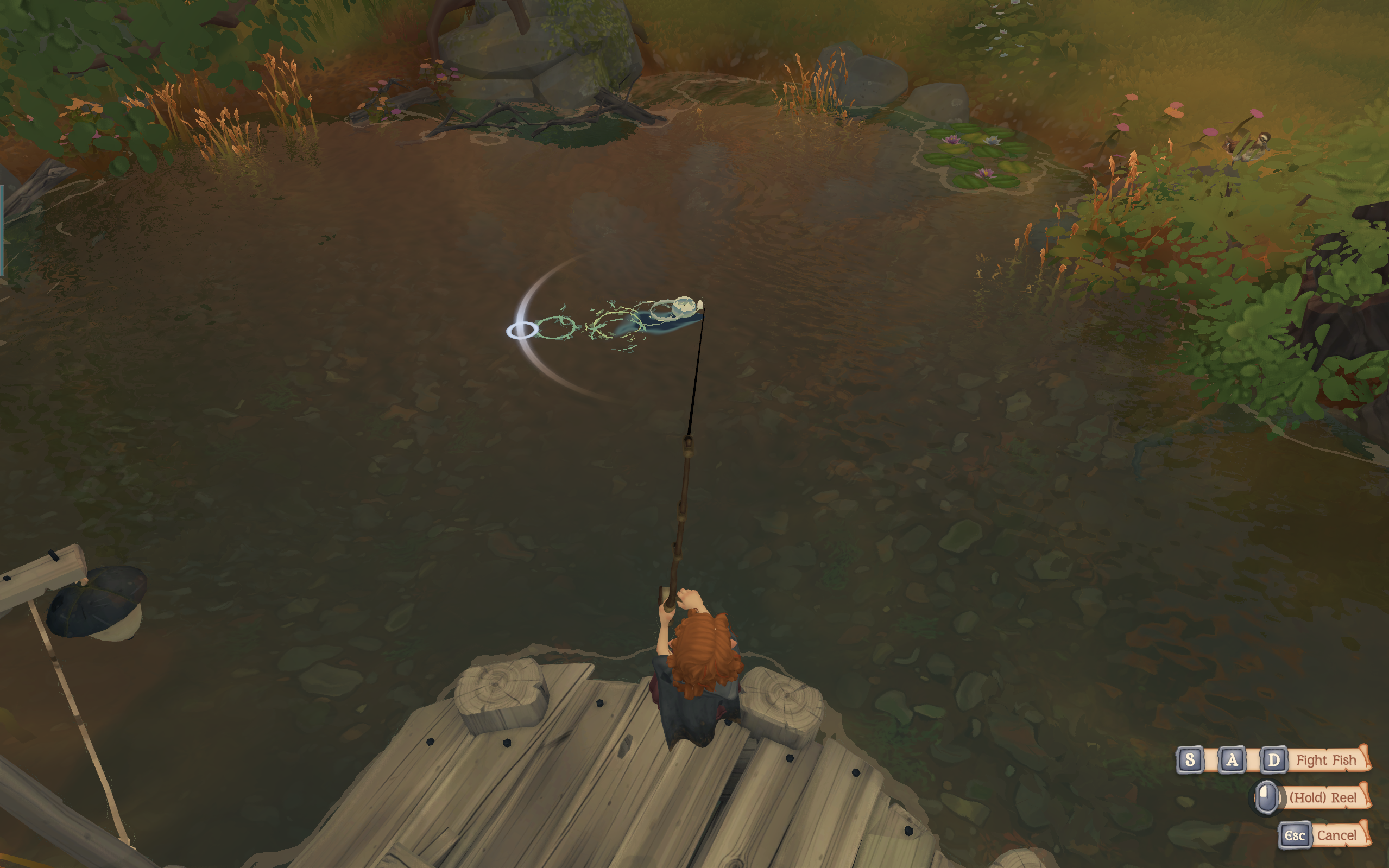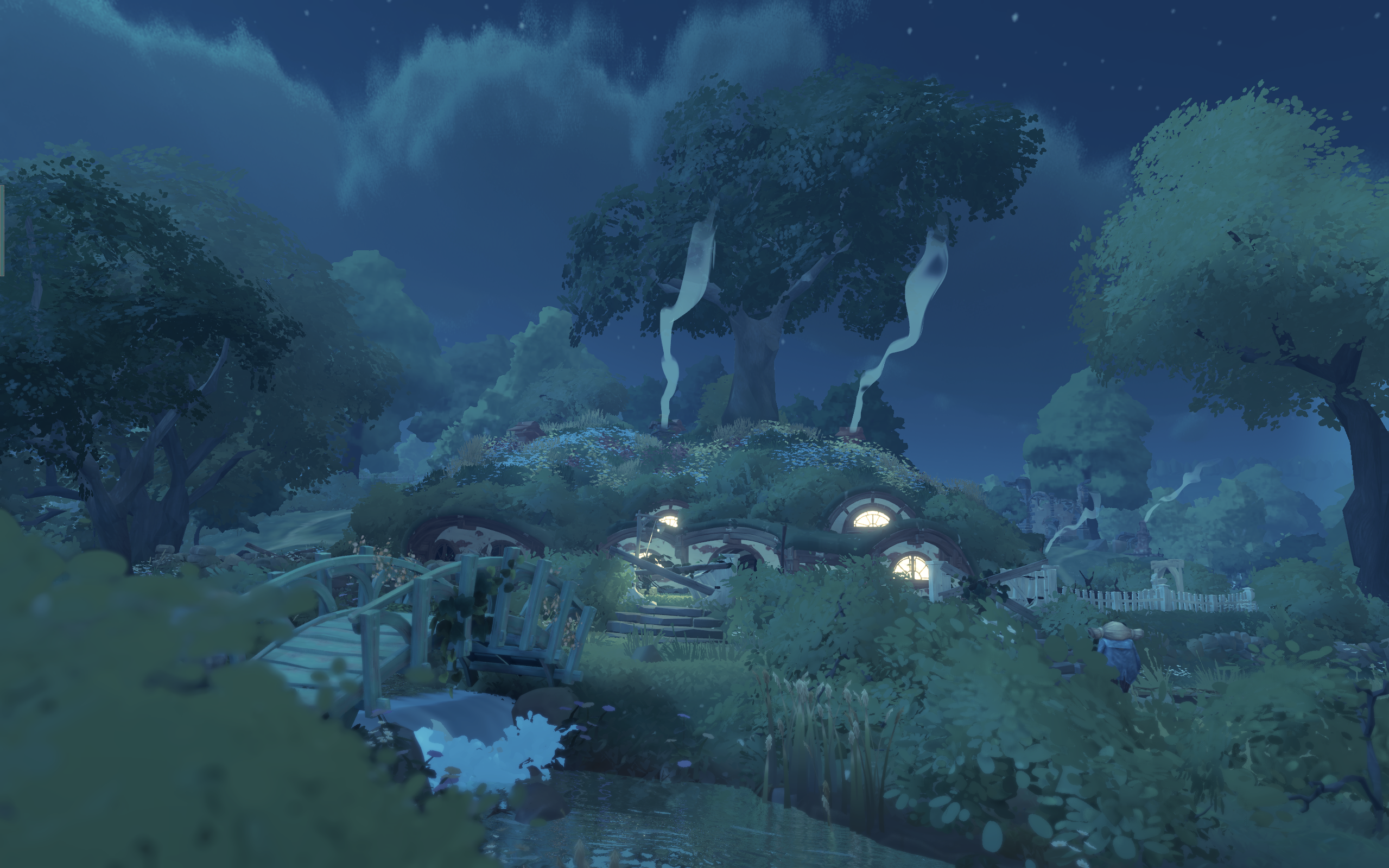I’ve loved many a Lord of the Rings game, but among them, the cozy life simulation game Tales of the Shire from developer Wētā Workshop stands out as an exciting attempt at something different. In recent years, the franchise has struggled to find its footing in gaming with panned releases like 2023’s Gollum and the Lord of the Rings: Return to Moria leaving fans desperate for a new twist on Middle Earth. Now, tackling the life sim genre, Tales of the Shire aims to do just that.
Reading and watching the Lord of the Rings, my greatest wish was always to spend more time in The Shire; to revel in the intricate mundanity of the home of Middle Earth’s most unlikely heroes; to delight in the fickle simplicity of country living; to enjoy a guilt-free second breakfast. It’s an escapism unmet in my life even in the verdant countryside of the UK, where you’ll sooner hear the roar of modern agriculture and 4×4 cars than you will the soft plucking of potatoes and mushrooms.
After playing a two-hour demo of the title recently, I’d say Tales of the Shire comes tantalizingly close to achieving the greatness we’ve been hoping for in the franchise, but it’s a success marred by some much-needed quality-of-life updates and a lack of depth. Still, I’m holding out hope.
It’s no bad thing to celebrate a simple life
Tales of the Shire sees, for the first time, an entirely lighthearted and heartwarming representation of Middle Earth, exchanging the squealing of Uruk-hai swarming the battlefield and the dark corridors of Moria for the lush greens and rolling hills of the Shire.
You begin by making your own Hobbit, greeted (to the surprise of none) by Gandalf the Grey, and ferried to your new digs in Bywater. Here, your only mission is to build a life for yourself, befriend your local community and, of course, decorate a smial (better known as a Hobbit-hole) so finely that you’ll be the envy of all Hobbit-kind. You’ll fish, farm, and forage across Bywater, all the while completing quests and tasks to help your neighbors and hosting Shared Meals to build your relationship with them.
“But where our hearts truly lie is in peace, and quiet, and good-tilled earth, for all Hobbits share a love of things that grow.”
Bilbo, The Fellowship of the Ring
The mechanics for everything in this game are designed to evoke a return to nature, enforcing wherever possible a laid-back, Hobbit-approved approach to gaming. Want to get from A to B quickly? Well, you can get there a little faster by skipping, but there’s no running in these parts. Want to navigate across town? Well, there’s no on-screen in-UI map, so you’ll either have to pause every ten seconds and wait for the fleet of bluebirds that flock to point the way to your chosen destination or just skip about aimlessly until you stumble upon the right path. Need a specific ingredient to cook a dish for your neighbor? Grow it, or wait until it respawns if it’s found out in the wilderness.
It’s a charming notion and one that feels well-suited to the game’s source material – it’s just a shame that the result isn’t very much fun.

To clarify, I did enjoy my time with Tales of the Shire, and as a huge cozy game and life sim fan, and I do think there’s a lot of potential in it. Based on the demo alone, however, it was likely for good reasons it was pushed back from being a 2024 release to 2025. The game feels hollow, missing much of the heart and earnestness I associate with Middle Earth’s most humble race.
The early game narrative is quaint; your Hobbit is moving into Bywater, which is not yet recognized as an official village in Hobbiton – and the locals have something to say about that. So, the first two hours of the game set the scene, albeit slowly and a little painfully at times, as you progress through endless waves of fetch quests to help the locals prove their case that Bywater should become a village. Without playing more of the game, it’s hard to tell if this narrative will be the golden goose that makes Tales of the Shire worth playing, but from what I experienced it’s a slow start.
“If more of us valued food and cheer and song above hoarded gold, it would be a merrier world.”
Thorin Oakenshield, The Hobbit
Its minigames are pleasant, yet unchallenging – though that seems to come at the expense of any real depth. Fishing is a bit monotonous in its lack of difficulty while foraging is also made all too easy with in-map markers for previously discovered resources. Farming’s only complexity is in its Companion Crops feature, which rewards you for planting crops with an affinity for one another, though I’m sure later in the game the seasons will also come into play with farming.

Cooking cusps upon being fun as you try to balance how chunky or smooth and how crisp or tender a meal is as you prepare it, adding seasoning to meet the taste requirements of your Planned Meal guests – but it’s still a point-and-click activity at best. The stakes are low, which is fine, but in a cozy game, the only real dopamine hit comes from the satisfaction of a job well done or a new milestone hit. In Tales of the Shire, those moments are few and far between.
I am in fact a Hobbit (in all but size). I like gardens, trees and unmechanized farmlands; I smoke a pipe, and like good plain food […]; I like, and even dare to wear in these dull days, ornamental waistcoats.
J.R.R. Tolkien
For a game that wants so badly to focus on relationships and community, the characters also lack the depth required to emotionally connect with the player. Yes, Hobbits are known for simplicity, but they’re also known for being capable of the extraordinary. Barring Delphinium, the foraging expert who lives beneath a tree in the forest and tends to be on the glum side, I was broadly uninterested in the key characters in Bywater – and I even got a few muddled up.
To the same end, Tales of the Shire’s lackluster attempt at populating Bywater means most of the Hobbits you’ll encounter are non-player characters (NPCs) you can’t interact with, outside of the one-liner speech bubbles displayed above their noggins occasionally. I’ve got nothing against an NPC, but Wētā Workshop clearly had to lean heavily on them to make Bywater feel alive.
Were you able to have some degree of socialization with them, even if just in passing, it wouldn’t be so bad, but the fact they are almost entirely superficial and offer no real purpose beyond world-building leaves a somewhat bitter taste in my mouth. Tales of the Shire broadly misses its opportunity to recreate the charming, nuanced characters of Tolkien’s world.

Not all those who wander are lost (but I am)
That neatly ties into the greatest disappointment of Tales of the Shire; its world-building. Bywater is beautiful, balancing its cutesy styling with Tolkein’s in-depth description of its verdant beauty. Winding pathways, fallen logs, and lush flora and fauna dapple its rolling hills, but its scale creates more problems than it solves. The map feels sizeable, but much of its contents take up too much space – and that’s especially the case with the inaccessible NPC housing cluttering the village center.
Bywater is, therefore, fiddly to navigate, with great swathes of the map being taken up by key locations like the tavern and town marketplace, housing, and a whole load of bridges. The central areas are oddly structured, with many hills and would-be shortcuts featuring oddly enforced barriers, meaning its designated pathways are trafficked all too often.
The Road goes ever on and on,
down from the door where it began.
Now far ahead the Road has gone,
and I must follow, if I canBilbo, The Fellowship of the Ring
Surrounding the village’s central stores and houses are fields and forests which offer a lot more freedom to roam. Its forested zone is easily the best, packed with nooks and crannies in which to forage and densely populated with non-interactive flora and fauna, but that’s probably the only area I took any great joy in exploring.
Otherwise, you can enjoy a vast yet sparse field, and for now at least that seems to be all there is to this game’s representation of The Shire – a fact I really hope is changed as you progress further in the game than my demo allowed.

Ride to meet your fortune
There’s a lot I could suggest needs improving before Tales of the Shire releases in 2025, but I don’t think it’s a lost cause.
For one thing, its home decoration mechanic is great. You can edit just about every aspect of your decor (and, at least in the demo, immediately had all of the styles and swatches available for use) and collect or buy furniture from locals to deck out your smile. Furniture placement is grid-free and smoothly allows you to place things on top of and inside one another. This was easily the most polished aspect of the game, and I’m genuinely excited to get back to it when the full game releases so I can also work towards unlocking the home’s many blocked passageways and rooms.
Tales of the Shire’s demo didn’t stick the landing, but it sounds like there are a few months left until full release, with Wētā Workshops sewing the seeds for a March release. If they can implement some much-needed quality-of-life improvements and balance out some of its vastness with more activities, it’ll prove to be a fun and engaging title for Lord of the Rings and life sim fans. But, as a wise wizard once said, “There is a long road ahead yet.”
Tales of the Shire releases in March 2025 on PC, PS5, Xbox Series X, Nintendo Switch, and Netflix Games.
